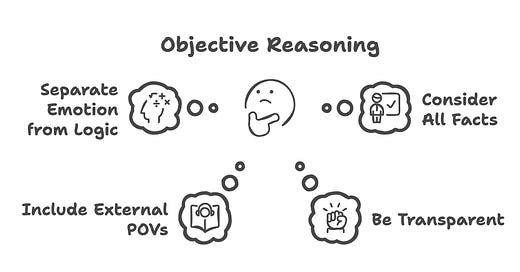Welcome to Path to Staff Engineering! I’m Sidwyn, and I will teach you skills needed to level up to the Staff level faster. If it's your first time here, subscribe to continue receiving this free content.
Have you ever been in a meeting where decisions were based on gut feelings or someone’s hunch? "It just feels right," they say, or "Let's go down this path because John thinks so."
You don’t want to be that person known for relying on intuition over solid reasoning.
To make good decisions in engineering, you need to reason objectively.
What is objective reasoning, and why should I care?
Objective reasoning is the process of making decisions with facts and data.
Making decisions without being influenced by personal biases or hunches.
Even if it goes against what you've said previously. Even if it means you were previously wrong.
But why even reason objectively?
Imagine working with someone who is flippant in their decisions. Someone who you can't reasonably predict. That would make your life really hard.
If you want to be respected on your team, you need to know you are wrong, and be able to cut through the noise.
Research has shown that people want to work with objective leaders in their decisions. Someone who can back up their decision with facts and truths. Someone logical.
How to reason objectively
Warning: Objective reasoning is not going to be easy. It takes extra mental work. But it's worth it.
With that said, here are three tips to reason objectively:
Separate emotion from logic
Make sure you are relying on something other than previous experiences or hunches impacting your current direction.
Ask yourself, "Am I making this choice because it feels right or because it’s supported by evidence?" This will help to remove bias.
Consider all the facts
Ensure that you have all the data you need to make the decision. This could involve consulting data scientists from multiple teams to gather metrics or reviewing past research.
Make sure to actually see the data, process it, and be convinced.
Consider POVs from others not in the room
If you're debating with another engineer, it's hard to take their side and see where they're coming from. Their expression may not be accurate.
In such cases, it's essential to zoom out and seek the opinions of others, especially if they're not in the room. Maybe a fellow teammate. Or your manager. Seek multiple perspectives on the situation.
Found this helpful? Subscribe to make sure you don’t miss new articles.
Post-reasoning
Once you have collected all the facts and made your choice, here's what you should do:
Be transparent about your decision-making
❌ I'm sure we should make this call to deprecate class.
✅ We are going to deprecate this piece of code because it's not used. As you can see, there's been 0 traffic in the past three months. I also reached out to multiple teams and no one is planning to use this code shortly. If they do need to, they can always revert this code, but I believe we should remove it and clean up the codebase.
Isn't that much clearer? You start with the conclusion but back it up with three facts: (1) no one uses it today, (2) no team uses it today, and (3) it's easy to revert.
Get comfortable with backing down
If you've discovered you're wrong, it's OK to admit you are. Don't leave the situation without resolving it.
❌ "Fine, do it your way." leaves the room
✅ "Darn, looks like I was incorrect – a stateless architecture is better here. Thanks for being patient with me."
Turn being wrong into an opportunity
If you're wrong, utilize this opportunity to build a stronger bond with the other side. Share your goals.
❌ "Cool, I'll see myself out then. You can take it from here."
✅ "Are there still opportunities to still implement that new feature? My team's goal is to increase subscriptions this half."
Reasoning objectively isn’t just a nice-to-have skill; it’s a game-changer.
You’ll be known as someone who cuts through the noise and leads with clarity.
And the best part? The benefits of objective reasoning extend beyond the workplace. Start applying it to personal decisions and watch how it improves your relationships.
Want to stand out as a thoughtful engineer? Start practicing objective reasoning today.




